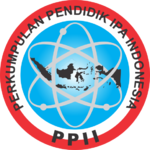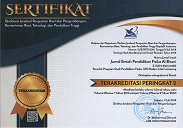Local wisdom-Based Electronic Book on Newton's Law
Abstract
Keywords
Full Text:
PDFReferences
Bauer, H. B. (2016). Industry 4.0 After The Initial Hype–Where Manufacturers are Finding Value and How They Can Best Capture It. McKinsey Digital.
Delima, E., Warsono, Supahar, & Jumadi. (2018). The Importance of Multimedia Learning Modules (Mlms) Based on Local Wisdom as an Instructional Media of 21st Century Physics Learning. Journal of Physics: Conference Series, 1097(1). https://doi.org/10.1088/1742-6596/1097/1/012018
Fatimah, S., & Mufti, Y. (2014). Pengembangan Media Pembelajaran IPA-Fisika Smartphone Berbasis Android sebagai Penguat Karakter Sains Siswa. Jurnal Kaunia, X(1), 59–64.
Ghofur, A., & Kustijono, R. (2015). Pengembangan E-Book Berbasis Flash Kvisoft Flipbook pada Materi Kinematika Gerak Lurus Sebagai Sarana Belajar Siswa SMA Kelas X. Inovasi Pendidikan Fisika, 04(02), 176–180.
Güney, B. G., & Seker, H. (2012). The use of History of Science as A Cultural Tool to Promote Students’ Empathy with The Culture of Science. Educational Sciences: Theory & Practice, 12(1), 533–539.
Hartini, S., Misbah, Helda, & Dewantara, D. (2017). The Effectiveness of Physics Learning Material Based on South Kalimantan Local Wisdom. AIP Conference Proceedings, 1868(August). https://doi.org/10.1063/1.4995182
Istifarida, B., Santoso, S., & Yusup, Y. (2017). Pengembangan E-Book Berbasis Problem Based Learning-GIS untuk Meningkatkan Kecakapan Berfikir Keruangan pada Siswa Kelas X SMA N 1 Sragen 2016/2017. Jurnal GeoEco, 03(02), 113–114. https://doi.org/10.20961/paedagogia.v20vi2.8596
Kurniawati, A. A., Wahyuni, S., & Putra, P. D. A. (2017). Utilizing of Comic and Jember’s Local Wisdom as Integrated Science Learning Materials. International Journal of Social Science and Humanity, 7(1), 47–50. https://doi.org/10.18178/ijssh.2017.7.1.793
Lee, H., Parsons, D., Kwon, G., Kim, J., Petrova, K., Jeong, E., & Ryu, H. (2016). Cooperation Begins: Encouraging Critical Thinking Skills Through Cooperative Reciprocity using A Mobile Learning Game. Computers and Education, 97, 97–115. https://doi.org/10.1016/j.compedu.2016.03.006
Meliantina. (2019). Menerapkan Budaya Literasi Guru Sekolah dalam Upaya Meningkatkan Pendidikan di Era Industri 4.0. Murobbi: Jurnal Ilmu Pendidikan, 3(2), 120–139.
Muhali, D. (2018). Arah Pengembangan Pendidikan Masa Kini Menurut Perspektif Revolusi Industri 4.0. Seminar Nasional Lembaga Penelitian Dan Pendidikan (LPP) Mandala, (September), 1–14.
Muna, I. A. (2015). Newton Menggunakan Certainty of Response Index ( Cri ). Cendekia, 13.
National Research Council. (2012). A Framework for K-12 Science Education: Practices, crosscutting Concepts, and Core Ideas. National Academies Press.
Pixyoriza. (2018). Pengembangan Media Pembelajaran Digital Book Menggunakan Kvisoft Flipbook Berbasis Problem Solving. Universitas Raden Intan.
Pratiwi, A. (2017). Pengembangan E-book Berbasis Metakognisi Menggunakan 3D Pageflip pada Materi Ikatan Kimia di Kelas X MIPA SMA Negeri 1 Muaro Jambi. Artikel Universitas Jambi.
Riswanto, R., & Dewi, N. A. K. (2017). Peningkatan Keterampilan Proses Sains melalui Pembelajaran Berbasis Laboratorium untuk Mewujudkan Pembelajaran Berkarakter. Jurnal Riset Dan Kajian Pendidikan Fisika, 4(2), 60. https://doi.org/10.12928/jrkpf.v4i2.8164
Saglam-Arslan, A., & Devecioglu, Y. (2010). Student Teachers’ Levels of Understanding and Model of Understanding about Newton’s Laws of Motion. Asia-Pacific Forum on Science Learning and Teaching, 11(1), 1–20.
Setiadi, A., Yuliatmojo, P., & Nurhidayat, D. (2018). Pengembangan Aplikasi Android untuk Pembelajaran Pneumatik. Jurnal Pendidikan Vokasional Teknik Elektronika, I(1), 1–5.
Subekt, H., Taufiq, M., Susilo, H., Ibrohim, I., & Suwono, H. (2017). Mengembangkan Literasi Informasi Melalui Belajar Berbasis Kehidupan Terintegrasi STEM untuk Menyiapkan Calon Guru Sains dalam Menghadapi Era Revolusi Industri 4.0: Revieu Literatur. Education and Human Development Journal, 3(1), 81–90. https://doi.org/10.33086/ehdj.v3i1.90
Sudarsono, M. A., & Krisnawati, K. (2014). Analisis dan Perancangan Aplikasi “Fun 2D Shapes Learning” Berbasis Mobile Android. Data Manajemen dan Teknologi Informasi (DASI), 15(2), 35.
Suseno, N., & Riswanto, R. (2017). Program Optimalisasi Peran Laboratorium Fisika SMA di Kota Metro, Lampung. Jurnal Pengabdian Pada Masyarakat, 2(2), 149–158. https://doi.org/10.30653/002.201722.28
Suwardana, H. (2018). Revolusi Industri 4.0 Berbasis Revolusi Mental. JATI UNIK : Jurnal Ilmiah Teknik Dan Manajemen Industri, 1(1), 102. https://doi.org/10.30737/jatiunik.v1i2.117
Syafii, M., & Musri, M. A. (2019). Meningkatkan Kemampuan Mahasiswa sebagai Sumber Daya Manusia Yang Siap Menghadapi Era Industri 4.0. Prosiding Seminar Nasional Era Industri (SNEI) 4.0, 1(1), 70–76. Retrieved from http://ejournal.upmi.ac.id/index.php/snei/article/view/35/25
Widoyoko, S. E. (2017). Teknik Penyusunan Instrumen Penilaian (6th ed). Yogyakarta: Pustaka pelajar.
Wu, W. C., & Perng, Y. H. (2016). Research on the Correlations Among Mobile Learning Perception Study Habits, and Continuous Learning. Eurasia Journal of Mathematics, Science and Technology Education, 12(6), 1665–1673. https://doi.org/10.12973/eurasia.2016.1556a
Yektyastuti, R., & Ikhsan, J. (2016). Developing Android-Based Instructional Media of Solubility to Improve Academic Performance of High School Students. Jurnal Inovasi Pendidikan IPA, 2(1), 88–99. https://doi.org/10.21831/jipi.v2i1.10289
DOI: http://dx.doi.org/10.24042/jipfalbiruni.v8i2.4368
Refbacks
- There are currently no refbacks.

Jurnal ilmiah pendidikan fisika Al-Biruni is licensed under a Creative Commons Attribution-ShareAlike 4.0 International License.
![]()







